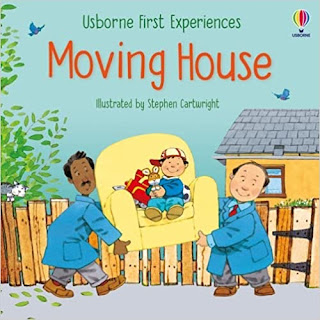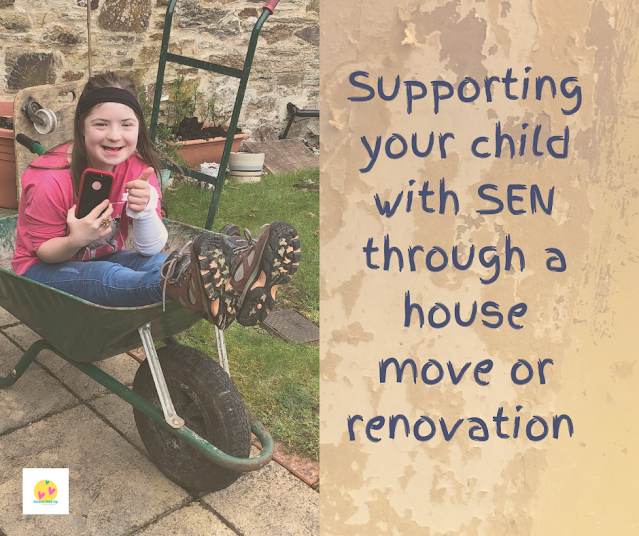Moving house is one of the most stressful events you can experience in life, or so they say.
Having moved three times in three years, whilst simultaneously going through a difficult divorce AND trying to main stability for Mia and Natty, I'd have to say I agree.
Moving house and living in an older property that needs work can take its toll on young people with special needs too. Their routine can be upset, they are not the focus of your energies and can feel destabilised without their familiar surroundings. Then there are their physical and medical needs to consider as well as doing any DIY safely.
But while moving has been exhausting, emotional and at times stressful for us, the girls and I have become closer as a result, and we've picked up some really useful hacks along the way.
Top Tips for Supporting your Child with SEN When You Are Moving House or Renovating a Property
- First things first You will want to choose the location of your new home with your family's needs in mind. Look for the locality of a suitable school, particularly if your child is in specialist education. You'll also need to look at nearby medical support and the proximity of other amenities such as transport links, accessible parks or support groups.
- Similarly, you will want to make sure your home can accommodate your child's requirements. If your child has a physical disability, you'll be looking at accessible access, room for equipment and so on. Children with sensory issues might prefer a quiet location, and for me safety was paramount. Natty is unaware of danger and so being away from a main road in a property with secure front door and a fenced-in garden were key.
- Prepare your child for the move by talking about what to expect. Show them the new house and perhaps make a scrap book of photos. You could create a social story or read a book such as Usborne's Moving Day.
- Allow your child to pack their own box of precious things that they want to have on the first night in the new home. It might include their favourite toys or a photograph.
- You might decide that moving house is best done while your child is at school or with a carer. But, if appropriate, older kids and teens might like to be involved. Helping out on removal day can help the move seem more real.
- Say goodbye to the old house. We stood in each room and remembered one happy thing that had happened there before we said farewell and hoped the new family would be happy there.
- Make the day as fun as possible even if you are stressed. Children pick up on our emotions and this will set the tone for how well you all settle in your new home. Perhaps a friend or cousin might like to come over to help. Natty was so excited when her beloved. Uncle Carl arrived to help us move and the whole day involved impromptu wheelbarrow rides!
- It sounds obvious, but make sure that bedding, favourite snacks, a kettle and tea bags and any medication or equipment your child needs travel with you. Have an essential box to hand as well, containing a few tools, light bulbs for quick fixes on arrival.
 |
| Support you child with a book about moving house |
- Settling in I quickly noticed that our house had condensation and mould on some of the windows. Damp and mildew isn't good for anyone, particularly a child with compromised immunity and a history of respiratory infections. So I decided to install a dehumidifying system.
- Making sure you are going to live in a safe and healthy environment is vital. It's worth paying a professional to check/install smoke and heat alarms immediately, as well as certifying electrics and gas boilers, fires and so on.
- I always sort out the girls' rooms first. A deep clean, a lick of paint and a few twinkle lights, go a long way to helping them feel settled. Using familiar rugs, duvet covers and putting up their art work will make everything feel homely quickly. I made their beds feel like new with a sumptuous hybrid mattress topper each from Simba*.
- I try to keep removal boxes in their bedrooms to a minimum so that they have a little calm haven to retreat to when the unpacking gets too much. Let youngster make choices about the layout and colour scheme of their rooms if you can.
- Take your time before embarking on bigger, more expensive projects. We love our 60s bungalow which has some quaint original features. I'm doing a lot of the basic DIY projects myself, like stripping wood chip wallpaper and painting the walls and skirtings. But after living here for a year, Mia, Natty and I have decided which bigger jobs are essential.
- Live in your for new home a while rather before you decide what needs doing. Some things you'll learn to live with and some things you will soon realise you can't stand. We have an original sliding patio door that is impossibly heavy for Natty to open by herself. I struggle too, so a replacement bi folding door is on our wish list.
- Easier said than done, but try to keep chaos, mess and dust to a minimum. Crucially paint or other chemical fumes are dangerous, so keep windows open and do this kind of work when youngsters are at school. Similarly keep dangerous tools locked away and out of sight.
- In moderation, every family member can have small achievable and safe chores to do in your new home. Being given jobs to do boosts young people's self-esteem and confidence. And we all want to be part of the removal and renovation A team after all, don't we 😊
















